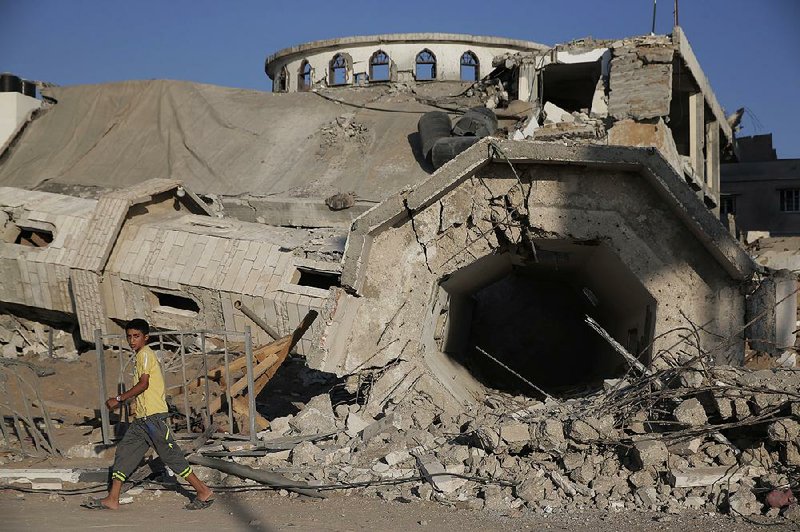3-day truce on, Gaza talks start again
CAIRO -- As a new temporary truce took hold, negotiators from Israel and the Hamas militant group resumed indirect talks Monday to reach a long-term cease-fire in the Gaza Strip.
The two sides were huddled in an Egyptian government building for what were expected to be marathon negotiations in the coming days.
The 72-hour truce, brokered by Egypt, is the second attempt to halt a month of heavy fighting between the sides.
A similar three-day truce collapsed Friday when militants resumed rocket fire on Israel after the sides were unable to make any headway in Egyptian-brokered negotiations for a more lasting deal. Hamas is seeking an end to an Israeli-Egyptian border blockade, while Israel wants Hamas to disarm.
U.S. probes of Afghan deaths called lax
KABUL, Afghanistan -- The U.S. failed to properly investigate civilian killings, including possible war crimes, which occurred during its military operations in Afghanistan, the international rights group Amnesty International said Monday.
A report by the group focused on 10 instances between 2009 and 2013 that it said saw 140 civilians killed during U.S. military operations. Amnesty said the vast majority of family members it interviewed said they had never been interviewed by U.S. military investigators.
Most of the episodes involved airstrikes and night raids carried out by U.S. forces. Both tactics have sparked heated criticism from Afghan civilians and the government who say the U.S. doesn't take enough care to prevent civilian deaths.
Two of the cases -- one in Paktia province in 2010 and another in Wardak province from November 2012 to February 2013 -- involved "abundant and compelling evidence of war crimes," the report said.
In a statement, NATO said it reviewed Amnesty's report, but did not comment on the specific episodes cited. It said it investigates all credible reports of civilian deaths in its operations when circumstances allow.
Date set to pick new premier in Turkey
ISTANBUL -- Turkey's governing party said Monday that it will select a new prime minister at the end of August to replace Recep Tayyip Erdogan, who won the country's first direct presidential election in a historic vote.
The Justice and Development Party will hold its party congress Aug. 27 to select the new prime minister, who also will be the new party head. The Turkey Constitution stipulates the president has to cut ties to any political party after being elected.
No specific name for the premiership was discussed during Monday's meeting, party spokesman Huseyin Celik said.
Erdogan won Sunday's election with 51.79 percent of the vote, according to election board figures released Monday. Challenger Ekmeleddin Ihsanoglu got 38.44 percent and Selahattin Demirtas, a young Kurdish politician, got 9.76 percent. Turnout was 74.13 percent -- a relatively low figure for Turkey, where voting is mandatory.
To Iranian, nuke-deal critics 'cowards'
TEHRAN, Iran -- Iranian President Hassan Rouhani offered his harshest criticism yet Monday of hard-liners opposed to making a deal over its contested nuclear program with world powers.
Iran reached a preliminary deal in November that curbed parts of its atomic program in exchange for the easing of some economic sanctions, an agreement hard-liners said gave too much away. Now, as negotiators face a Nov. 24 deadline to reach a final deal, hard-liners have been increasing their pressure on Rouhani and those trying to reach a compromise with the West.
Speaking Monday to an annual meeting of Iranian ambassadors, Rouhani called his hard-line critics "political cowards."
"Anytime there is going to be negotiations, a handful say we are shaking. Go and find a warm place for yourself. What should we do?" an angry Rouhani said in comments broadcast live on state television.
Supreme Leader Ayatollah Ali Khamenei, who has the final say on all state matters, has backed the nuclear negotiating team. Yet that hasn't stopped hard-liners from calling the interim nuclear deal a "poison chalice" for Iran.
They also organized a high-profile meeting last month to criticize Rouhani and the negotiators, saying the government has no right to accept limitations on Iran's uranium enrichment.
-- COMPILED BY DEMOCRAT-GAZETTE STAFF FROM WIRE REPORTS
A Section on 08/12/2014

